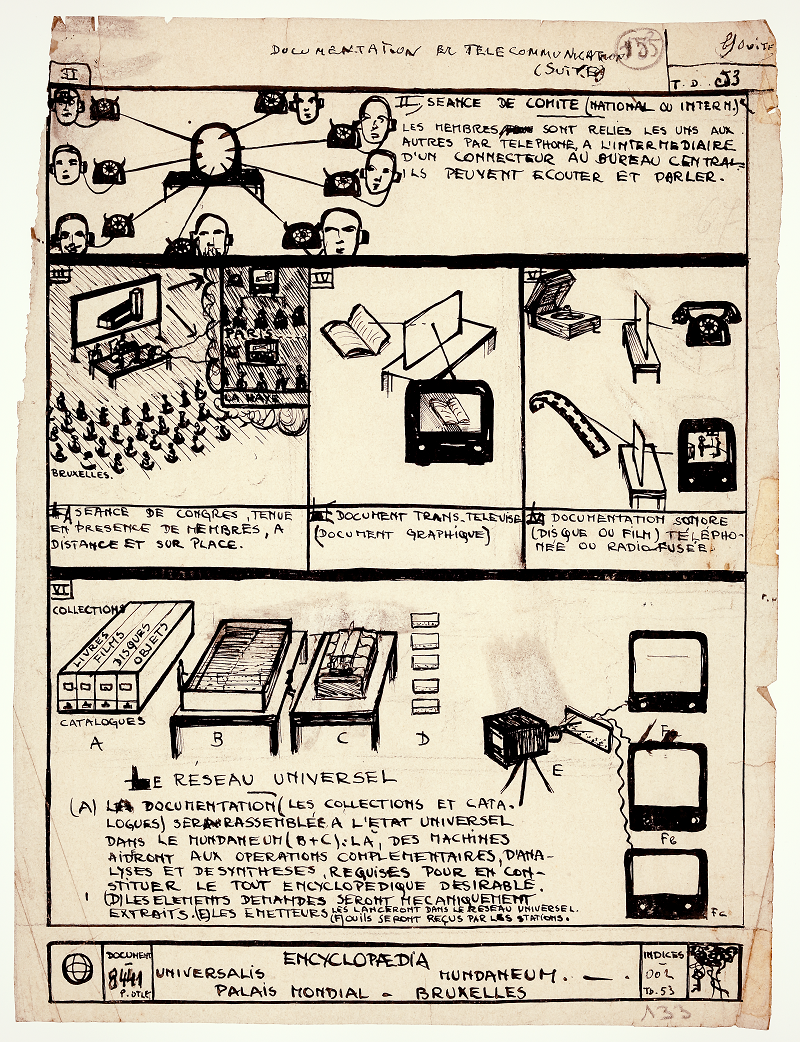 Paul Otlet's scheme on information and distant communication, Mundaneum, Archive Centre of the French Community of Wallonia-Brussels, Mons, Belgium. © Mundaneum
Paul Otlet's scheme on information and distant communication, Mundaneum, Archive Centre of the French Community of Wallonia-Brussels, Mons, Belgium. © Mundaneum
The Programming Historian en français is on air! You can find us on http://programminghistorian.org/fr. The launch of a francophone version comes two years after the inauguration of a successful Spanish-speaking edition, and confirms the ongoing internationalisation of the original English-speaking project. We propose open peer-reviewed tutorials that aim at helping historians and other humanists to gain familiarity with interdisciplinary methods, digital tools, and workflows that enable them to conduct research projects and teaching duties with use of digital data. As diversity is at the core of the global project, all variations of the French language are accepted. Moreover, The Programming Historian en français is committed to the use of the gender-inclusive writing following the principles set by the Office québécois de la langue française.
We currently work principally on translations of the existing tutorials. If you wish to suggest an existing lesson to translate, for example for use in your classroom, or if you want to contribute yourself either translating or reviewing an existing translation, or even proposing an original lesson, please let us know. You can find more information on how to contribute in the dedicated page of our web site. We are eager to receive your proposals!
The francophone project has found spontaneous support from the community since its beginnings. We thank warmly all volunteers who acted either as translators or reviewers, and the students of the master “Digital Technologies Applied to History” of the École nationale des chartes, Paris, France for offering a corpus of translations prepared as an exercice for their English class. A big thanks also to all friends who participated in our exchanges regarding the title and the logo of the francophone version.
Preparing The Programming Historian to accommodate languages beyond English and Spanish required extended effort from our technical team, in particular from Matthew Lincoln, whose development time was supported through an in-kind grant from the dSHARP lab at Carnegie Mellon University and the Andrew W. Mellon Foundation. We express all of our gratitude for their help.
Last but not least: the launch of The Programming Historian en français is a team achievement in the sense that the intensive work of the French-speaking sub-team was greatly helped by exchanges with its Spanish-speaking counterpart, and the continuing support from more experienced members of the global team. Their technical and pedagogical skills counted a lot for a new sub-team to integrate and get familiar with running an open-access project on Github. We are grateful to them for this beautiful team accomplishment. We are thrilled to be part of this global project and look forward for what comes next!
We are grateful to Mundaneum, Archive Centre of the French Community of Wallonia-Brussels, Mons, Belgium, for allowing use of the digitized image of Paul Otlet’s scheme on information and distant communication. © Mundaneum
About the author
Sofia Papastamkou is a historian and Research Engineer in Digital Humanities at the French National Center for Scientific Research (CNRS).
She is currently assigned to the Institut de recherches historiques du Septentrion (IRHiS, CNRS/University of Lille).
